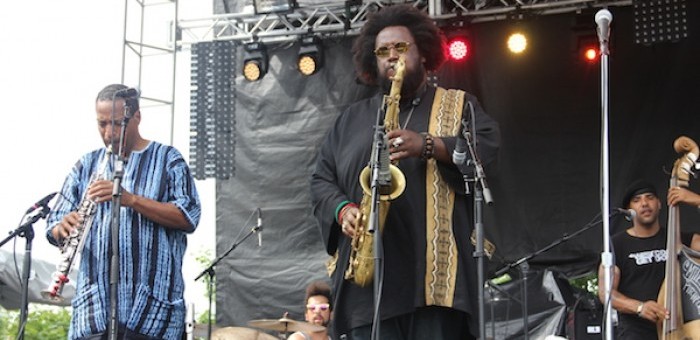Jan 13, 2026 2:09 PM
More Trump-Kennedy Center Cancellations
The fallout from the renaming of the John F. Kennedy Center for the Performing Arts to include President Donald…

Rickey Washington (left), Tony Austin, Kamasi Washington and Miles Mosley perform at the Pitchfork Music Festival in Chicago on July 17.
(Photo: Brian Zimmerman)In jazz circles, the buzz surrounding the 11th annual Pitchfork Music Festival, which took place July 15–17 at Chicago’s Union Park, was that not one, not two, but three jazz artists had been scheduled to perform on the festival’s final day.
Though hardly earth-shattering, the programming note was a justifiably newsworthy one, given that Pitchfork Media, a bastion of rock and pop criticism, hadn’t allotted such ample time to jazz since the mid-2000s, when appearances by artists such as guitarists Jeff Parker and Nels Cline, reedist Ken Vandermark, trumpeter Rob Mazurek and bassist William Parker were not uncommon.
But if Pitchfork’s programming reflects the listening trends of young, media-savvy music consumers, it makes sense that this year’s festival would mark the triumphant return of jazz, which has witnessed a resurgence among popular audiences of late. And it seems even more logical that Pitchfork Festival’s musical director, the Chicago-based jazz drummer Mike Reed, would mark the genre’s homecoming with three of its most compelling crossover acts: saxophonist Kamasi Washington, bassist Thundercat and the Sun Ra Arkestra.
Though just past the halfway mark, 2016 has been a banner year for Washington. Not only did the saxophonist win the inaugural American Music Prize for Best Debut Album—for his three-disc set The Epic (Brainfeeder)—but he was also named Rising Star–Jazz Artist and Rising Star–Tenor Saxophone in the DownBeat Critics Poll (The Epic also won for Jazz Album of the Year).
Extending his reach into the hip-hop world, Washington served as a collaborator on Kendrick Lamar’s Grammy-winning 2015 album, To Pimp A Butterfly (Top Dawg), a credit that brought widespread exposure to his unconventional genius.
As jazz’s most talked-about artist, Washington was no doubt a presence in the collective musical conscious—if not the playlists—of his audience at Pitchfork, which skewed overwhelmingly young. In front of a packed crowd, he delivered a terse but powerful set of swaggering funk, stormy hip-hop and sinewy jazz that was as musically satisfying as it was emotionally purifying.
In and of itself, Washington’s aesthetic—the Afro-futurist propensities, the sprawling, open-ended musical incantation—is hardly new. As countless critics have pointed out, the saxophonist’s heritage is that of the spiritual jazz-funk vein, with Pharoah Sanders and John Coltrane as obvious precursors. Indeed, his July 17 performance at Pitchfork seemed to point to these early influences. A solo on “Cherokee,” a remake of the Ray Noble standard, found Washington unfurling cascading lines in the upper register, à la Coltrane; and on “Re Run Home,” a dreamy waterfall of an r&b tune, the saxophonist dealt in clean, uncomplicated solo lines that accelerated into pure energy, à la Sanders.
But historical fidelity isn’t Washington’s only appeal, and while his music draws freely from the past, it also engages in a sharp and artistically fruitful examination of the present. Washington’s musical appetite represents a mystifying confluence of styles and sounds, both modern and traditional, which is why watching his set at Pitchfork was like watching two strains of musical phenomena converge. Through his tantric musical persona, the cathartic, mind-loosening repetitiveness of current hip-hop and the organic, improvised reactiveness of jazz collude into one stream.

Belá Fleck during an interview with Fredrika Whitfield on CNN.
Jan 13, 2026 2:09 PM
The fallout from the renaming of the John F. Kennedy Center for the Performing Arts to include President Donald…

Peplowski first came to prominence in legacy swing bands, including the final iteration of the Benny Goodman Orchestra, before beginning a solo career in the late 1980s.
Feb 3, 2026 12:10 AM
Ken Peplowski, a clarinetist and tenor saxophonist who straddled the worlds of traditional and modern jazz, died Feb. 2…

The success of Oregon’s first album, 1971’s Music Of Another Present Era, allowed Towner to establish a solo career.
Jan 19, 2026 5:02 PM
Ralph Towner, a guitarist and composer who blended multiple genres, including jazz — and throughout them all remained…

Rico’s Anti-Microbial Instrument Swab
Jan 19, 2026 2:48 PM
With this year’s NAMM Show right around the corner, we can look forward to plenty of new and innovative instruments…

Richie Beirach was particularly renowned for his approach to chromatic harmony, which he used to improvise reharmonizations of originals and standards.
Jan 27, 2026 11:19 AM
Richie Beirach, a pianist and composer who channeled a knowledge of modern classical music into his jazz practice,…